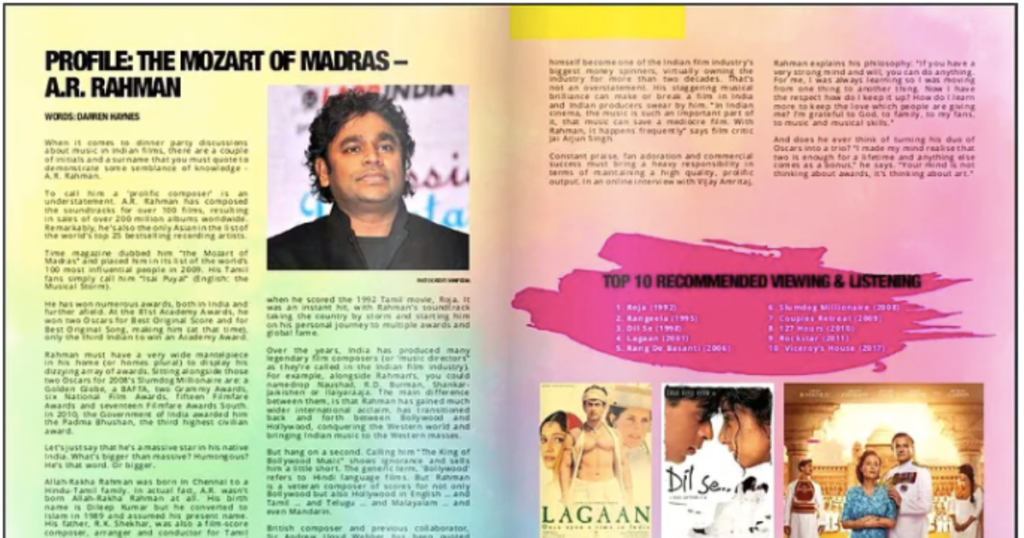
Hey Music’s, Darren Haynes, leads the appreciation of one of the greatest Asian composers of all time. [First published in August 2018]
When it comes to dinner party discussions about music in Indian films, there are a couple of initials and a surname that you must quote to demonstrate some semblance of knowledge — A.R. Rahman.
To call him a ‘prolific composer’ is an understatement. A.R. Rahman has composed the soundtracks for over 100 films, resulting in sales of over 200 million albums worldwide. Remarkably, he’s also the only Asian in the list of
the world’s top 25 bestselling recording artists.
Time magazine dubbed him “the Mozart of Madras” and placed him in its list of the world’s 100 most influential people in 2009. His Tamil fans simply call him “Isai Puyal” (English: the Musical Storm).
He has won numerous awards, both in India and further afield. At the 81st Academy Awards, he won two Oscars for Best Original Score and for Best Original Song, making him (at that time), only the third Indian to win an Academy Award.
Rahman must have a very wide mantelpiece in his home (or homes plural) to display his dizzying array of awards. Sitting alongside those two Oscars for 2008’s Slumdog Millionaire are: a Golden Globe, a BAFTA, two Grammy Awards, six National Film Awards, fifteen Filmfare Awards and seventeen Filmfare Awards South. In 2010, the Government of India awarded him the Padma Bhushan, the third highest civilian award.
Let’s just say that he’s a massive star in his native India. What’s bigger than massive? Humongous? He’s that word. Or bigger.
Allah-Rakha Rahman was born in Chennai to a Hindu-Tamil family. In actual fact, A.R. wasn’t born Allah-Rakha Rahman at all. His birth name is Dileep Kumar but he converted to Islam in 1989 and assumed his present name.
His father, R.K. Shekhar, was also a film-score composer, arranger and conductor for Tamil and Malayalam films and was supportive of Rahman’s musicianship until his death when Rahman was just nine years old.
Rahman took inspiration from western music as well as more traditional Indian music. He recalls listening to Jim Reeves and The Carpenters alongside the work of Indian film composers such as Madan Mohan, Naushad Ali and Roshan (who wrote in Hindi) and Tamil composers including K.V. Mahadevan and Vishwanatiian Ramamurthy.
As a music director, his big breakthrough came when he scored the 1992 Tamil movie, Roja. It was an instant hit, with Rahman’s soundtrack taking the country by storm and starting him on his personal journey to multiple awards and global fame.
Over the years, India has produced many legendary film composers (or ‘music directors’ as they’re called in the Indian film industry). For example, alongside Rahman’s, you could namedrop Naushad, R.D. Burman, Shankar- Jaikishen or Ilaiyaraaja. The main difference between them, is that Rahman has gained much wider international acclaim, has transitioned back and forth between Bollywood and Hollywood, conquering the Western world and bringing Indian music to the Western masses.
But hang on a second. Calling him “The King of Bollywood Music” shows ignorance and sells him a little short. The generic term, ‘Bollywood’ refers to Hindi language films. But Rahman is a veteran composer of scores for not only Bollywood but also Hollywood in English … and Tamil … and Telugu … and Malayalam … and even Mandarin.
British composer and previous collaborator, Sir Andrew Lloyd Webber has been quoted as saying “A.R. Rahman is nothing short of a melodic genius. I admire his unique sense of harmony, his staggering rhythms and his melodies that take an unexpected twist that no Western composer would dream of.”
It’s impossible to argue with that tribute. A.R. Rahman can do no wrong. It seems that everything the composer-songwriter-singerproducer- multi-instrumentalist touches turns to gold.
Indeed, he is credited with single-handedly revolutionising Indian film music and has himself become one of the Indian film industry’s biggest money spinners, virtually owning the industry for more than two decades. That’s not an overstatement. His staggering musical brilliance can make or break a film in India and Indian producers swear by him. “In Indian cinema, the music is such an important part of it, that music can save a mediocre film. With Rahman, it happens frequently” says film critic Jai Arjun Singh.
Constant praise, fan adoration and commercial success must bring a heavy responsibility in terms of maintaining a high quality, prolific output. In an online interview with Vijay Amritaj, Rahman explains his philosophy: “If you have a very strong mind and will, you can do anything. For me, I was always learning so I was moving from one thing to another thing. Now I have the respect how do I keep it up? How do I learn more to keep the love which people are giving me? I’m grateful to God, to family, to my fans, to music and musical skills.”
And does he ever think of turning his duo of Oscars into a trio? “I made my mind realise that two is enough for a lifetime and anything else comes as a bonus,” he says. “Your mind is not thinking about awards, it’s thinking about art.”
